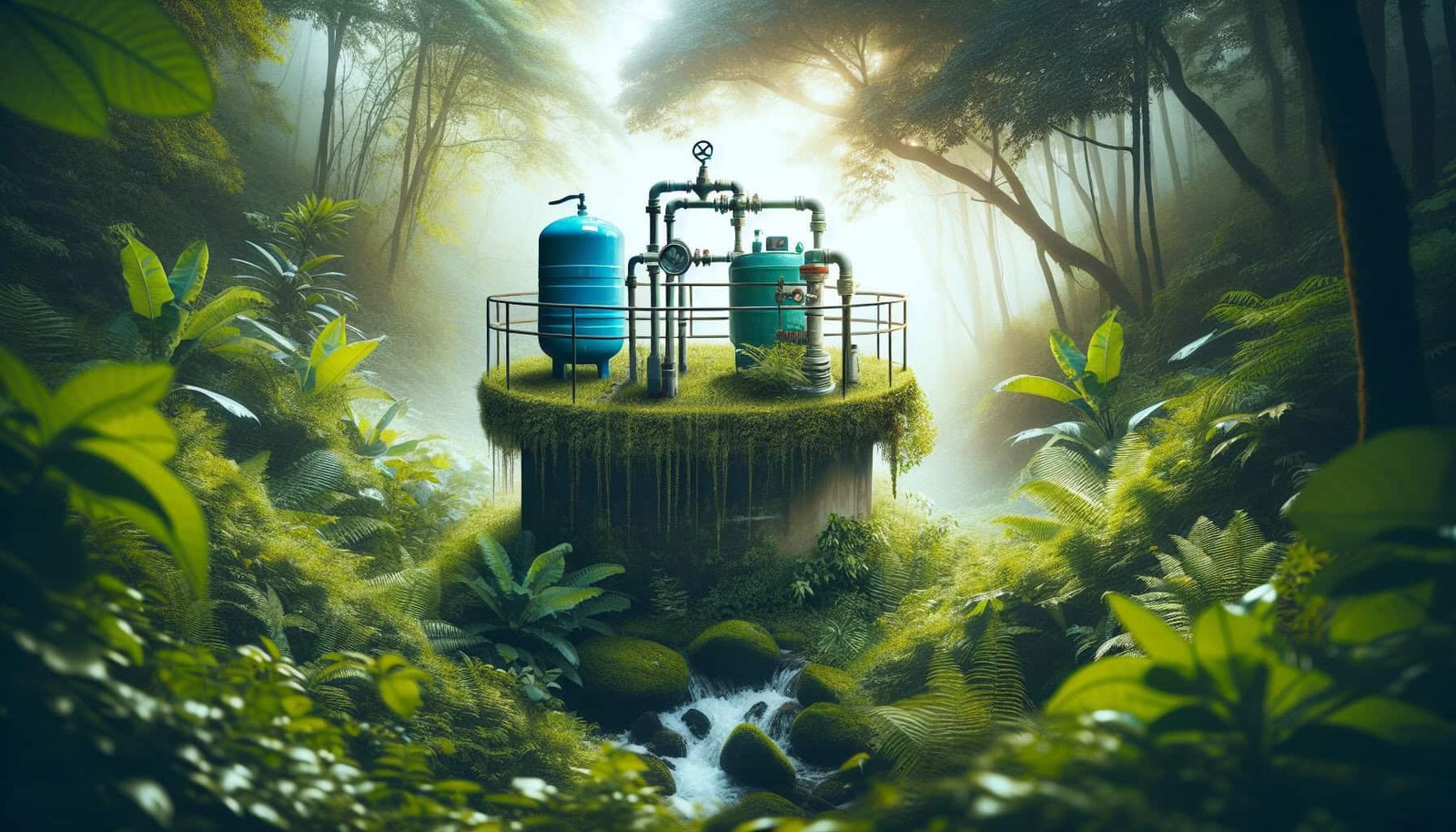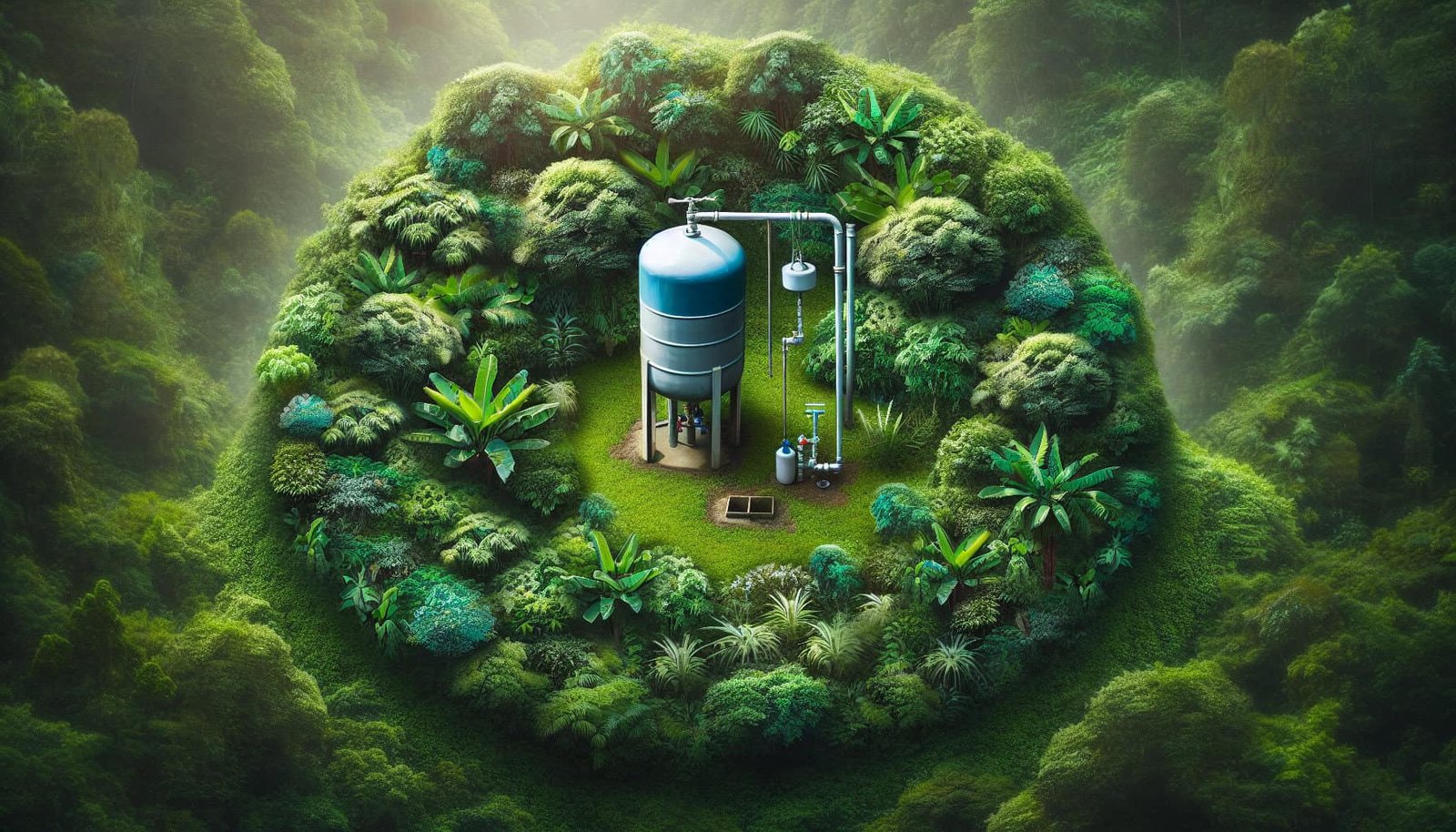If you are living in a region that relies on well water and has specific maintenance schedules for the well water pressure tank, it is essential to address safety concerns related to this vital resource. Ensuring that the water from your well remains safe and free from contaminants is of utmost importance for the well-being of you and your family. In this article, we will explore some actionable steps you can take to address these safety concerns effectively, providing you with peace of mind and confidence in the quality of your well water.
Importance of Addressing Safety Concerns
Ensuring the safety of your well water is of utmost importance. Contaminated well water can pose serious health risks to you and your family. It is crucial to understand the dangers associated with contaminated well water and the risks that can arise in regions with well water pressure tank maintenance schedules.
Understanding the Dangers of Contaminated Well Water
Contaminated well water can contain harmful substances such as bacteria, viruses, chemicals, and heavy metals. These contaminants can enter the well water from various sources, including nearby agricultural activities, industrial pollutants, or improper disposal of household waste. Consumption of contaminated well water can lead to severe health effects, including gastrointestinal issues, respiratory problems, and even long-term illnesses.

Exploring the Risks for Regions with Well Water Pressure Tank Maintenance Schedules
Regions with well water pressure tank maintenance schedules face unique risks when it comes to safety concerns. Pressure tanks play a crucial role in maintaining the water pressure in the well system. However, if not properly maintained, pressure tanks can become breeding grounds for bacteria and other harmful contaminants. Regular maintenance of pressure tanks is essential to prevent the buildup of sediment, corrosion, and bacterial growth that can contaminate the well water.
Understanding Well Water Pressure Tank Maintenance
Overview of Well Water Pressure Tanks
Well water pressure tanks are an integral part of a well water system. They store water under pressure, ensuring a steady flow of water to the faucets and fixtures in your home. Pressure tanks are typically made of steel or fiberglass and consist of an air bladder or diaphragm that separates the water and air inside the tank. Understanding the components and functioning of a pressure tank is crucial for maintaining its efficiency and preventing contamination.
Significance of Regular Maintenance
Regular maintenance of well water pressure tanks is essential for maintaining water quality and preventing safety concerns. Over time, sediment, minerals, and bacteria can accumulate in the tank, compromising the quality of the well water. Routine maintenance tasks, such as flushing the tank, inspecting the bladder or diaphragm, and checking pressure levels, help in identifying and addressing potential issues before they escalate. By adhering to a maintenance schedule, you can ensure the longevity of your pressure tank and the safety of your well water.
Typical Maintenance Schedules
Maintenance schedules for well water pressure tanks may vary depending on factors such as tank size, water usage, and local regulations. However, a general guideline is to conduct regular inspections every six months and perform maintenance tasks annually. It is recommended to consult with a certified well inspector or contractor to determine the specific maintenance needs of your pressure tank based on your region and individual circumstances.

Identifying Safety Concerns
Potential Contaminants in Well Water
Well water can be susceptible to various contaminants, including bacteria, viruses, parasites, chemicals, and heavy metals. These contaminants can enter the well water through natural sources, such as groundwater pollution, or human activities like agricultural practices, industrial discharges, or faulty septic systems. Understanding the potential contaminants in your region can help you take the necessary precautions and implement effective treatment methods.
Risks Associated with Inadequate Maintenance
Inadequate maintenance of well water systems, including pressure tanks, can lead to several safety concerns. Accumulation of sediment and bacteria in the tank can cause foul odors, discoloration of water, and even well system failures. These issues not only affect the quality of the well water but also increase the risk of potential health hazards. Neglecting maintenance can also result in premature wear and tear of the pressure tank and other components, leading to costly repairs or replacements.
Health Effects of Consuming Contaminated Water
Consuming contaminated well water can have adverse health effects. Bacteria and viruses present in the water can cause gastrointestinal illnesses, such as diarrhea and vomiting. Chemical contaminants, such as pesticides or heavy metals, can lead to long-term health problems, including organ damage and developmental issues in children. It is vital to address safety concerns related to well water to ensure the well-being and health of you and your family.
Assessing Water Quality
Conducting Water Sampling and Testing
Regular water sampling and testing are essential to assess the quality of your well water and identify potential contaminants. Sampling involves collecting water samples from various points in your well system, including the pressure tank. The samples are then sent to a certified laboratory for testing. Testing can determine the presence of bacteria, viruses, chemicals, and other contaminants in your well water, enabling you to take appropriate actions for treatment or maintenance.
Interpreting Water Quality Reports
Interpreting water quality reports can be overwhelming, but it is essential to understand the results to address any safety concerns effectively. Water quality reports provide information about the concentration of contaminants detected in your well water. These reports may also include guidelines or regulatory limits for each contaminant, allowing you to determine whether your well water meets the required standards. If the report indicates levels exceeding the recommended limits, it is crucial to take prompt action to mitigate the risks.
Recognizing Common Indicators of Contamination
In addition to water sampling and testing, it is important to be aware of common indicators of contamination in your well water. Foul odors, such as a rotten egg smell or a chlorine-like scent, turbidity or cloudiness, and unusual taste or discoloration are potential signs of contamination. If you notice any of these indicators, it is recommended to conduct water testing and consult with a professional to assess the safety of your well water and determine the appropriate course of action.

Well Water Treatment Methods
Importance of Water Treatment
Water treatment plays a vital role in ensuring the safety and quality of your well water. Treatment methods can effectively remove or reduce contaminants, allowing you to have clean and safe water for your everyday needs. Implementing appropriate treatment techniques is crucial to address safety concerns related to well water and provide peace of mind.
Common Treatment Techniques
Several treatment techniques are available for well water depending on the type of contaminants present. Filtration systems with activated carbon or reverse osmosis membranes can effectively remove bacteria, viruses, and chemical contaminants. Chlorination or disinfection methods can help in controlling microbial growth. Water softeners can be used to address issues related to hard water or excessive mineral content. It is important to choose treatment methods based on the specific needs and challenges of your well water.
Applying Suitable Treatment Methods based on Contaminant Type
The selection of suitable treatment methods should be based on the specific contaminants identified in your well water. Understanding the types of contaminants and their sources can help you determine the most appropriate treatment techniques. Consulting with water treatment professionals or certified well inspectors can assist you in making informed decisions about the best treatment methods for your well water.
Ensuring Proper Well Construction
Importance of Well Construction
Proper well construction is crucial for preventing potential safety concerns and ensuring the longevity of your well system. Well construction involves various steps, including selecting an appropriate location, drilling the well, and installing casing and sealing materials. By adhering to proper construction practices, you can minimize the risk of surface contamination, prevent the entry of pollutants, and maintain the overall integrity of the well structure.
Ensuring Adequate Casing and Sealing
Casing and sealing materials are essential components of a well that help protect the groundwater from contamination. Casing is a pipe inserted into the well to provide structural support and prevent the collapse of the well hole. Sealing materials, such as grout or bentonite clay, are used to create a watertight seal between the casing and the surrounding ground, preventing the entry of surface water or contaminants. Regular inspection and maintenance of casing and sealing materials are necessary to ensure their effectiveness.
Preventing Surface Contamination and Pollution
Preventing surface contamination and pollution is crucial for maintaining the safety and quality of your well water. Wellheads should be properly sealed and protected to prevent the entry of surface water, debris, or contaminants. It is important to avoid storing hazardous materials near the well, ensure proper disposal of waste, and implement good agricultural practices to minimize the risk of pollutants entering the groundwater. By taking preventive measures, you can reduce the potential for safety concerns and maintain the integrity of your well system.

Maintaining Well Infrastructure
Regular Well Inspections
Regular inspections of your well system are essential for identifying any potential issues and ensuring its proper functioning. Well inspections should be conducted by a certified well inspector who can assess the condition of the well components, including the pressure tank. Inspections can help in detecting signs of corrosion, degradation, or leaks that may compromise the water quality or safety of your well. Routine inspections should be part of your maintenance plan to address any underlying concerns promptly.
Performing Routine Maintenance Tasks
Performing routine maintenance tasks is vital for the overall maintenance of your well system, including the pressure tank. Flushing the pressure tank regularly helps remove sediment and bacteria, ensuring the cleanliness of your well water. Inspecting the pressure tank’s bladder or diaphragm for any damage or wear is also important to maintain the tank’s efficiency. Monitoring the pressure levels and adjusting as needed can prevent excessive strain on the tank and extend its lifespan.
Addressing Common Well-Related Issues
Common well-related issues, such as low water pressure, intermittent water supply, or unusual noise from the well system, should be promptly addressed to prevent safety concerns. These issues can be indicative of problems with the pressure tank, well pump, or other components. Consulting with a certified well contractor or inspector can help identify the cause of the issue and implement the necessary repairs or replacements. Prompt action can save you from potential disruptions and ensure the continued safety of your well water.
Promoting Safe Well Water Practices
Educating Well Owners and Users
Educating yourself, your family, and other well owners in your region about safe well water practices is crucial for preventing safety concerns. Promoting awareness about the potential risks associated with well water contamination and the importance of regular maintenance creates a sense of responsibility and encourages proactive measures. Sharing information about the significance of water testing, treatment techniques, and proper waste disposal can help in fostering a community-wide commitment to safe well water practices.
Implementing Best Practices for Water Usage
Implementing best practices for water usage can contribute to the safety and conservation of your well water. Avoiding excessive water usage, repairing leaks promptly, and practicing water-saving techniques can help in maintaining a sustainable water supply. Additionally, avoiding chemical-intensive activities near the well, such as pesticide or fertilizer application, can minimize the chances of groundwater contamination. By adopting responsible water usage habits, you can contribute to the preservation and safety of your well water.
Proper Waste Disposal and Chemical Handling
Proper waste disposal and chemical handling are critical for preserving the safety of your well water. Dispose of hazardous materials, including paints, oils, pharmaceuticals, and cleaning agents, through appropriate channels and refrain from pouring them down the drain or onto the ground. Follow guidelines for septic system maintenance, such as regular pumping and inspection, to prevent leaks or contamination. By handling waste and chemicals responsibly, you can safeguard the quality and integrity of your well water.

Working with Professionals
Role of Certified Well Inspectors and Contractors
Certified well inspectors and contractors play a crucial role in ensuring the safety and maintenance of your well system. Well inspectors are trained professionals who assess the condition of your well, including the pressure tank, and provide recommendations for maintenance or repairs. Well contractors are responsible for drilling new wells, installing well components, and performing repairs or replacements. Engaging with experienced and certified professionals can provide you with expert guidance and ensure the long-term safety of your well water.
Finding Qualified Professionals
Finding qualified professionals for well inspection, maintenance, and repair can be done through various channels. Local health departments, well water associations, or online directories can provide valuable resources for locating certified well inspectors and contractors in your area. It is essential to verify their credentials, experience, and expertise before engaging their services. Recommendations from trusted sources, such as neighbors or friends with well systems, can also help you find reliable professionals for your well water management needs.
Engaging in Collaborative Well Water Management
Collaboration with professionals and other well owners in your region is instrumental in maintaining safe well water practices. Participating in community workshops or educational programs on well water management can provide valuable insights and networking opportunities. Sharing experiences, challenges, and best practices with other well owners can help create a supportive network, fostering mutual learning and improvement. Collaborative well water management can ensure a collective effort in addressing safety concerns and protecting the overall well-being of the community.
Regulatory Measures and Support
Understanding Local, State, and National Regulations
Understanding the local, state, and national regulations governing well water is crucial for addressing safety concerns effectively. These regulations may include guidelines for well construction, water testing, maintenance, and treatment. Familiarizing yourself with the specific requirements and standards applicable to your region can help you comply with the regulations and ensure the safety and legality of your well water. Local health departments or environmental agencies can provide information and assistance regarding regulatory compliance.
Seeking Assistance from Environmental and Health Agencies
Environmental and health agencies can provide valuable guidance and support in addressing safety concerns related to well water. These agencies can offer resources for water testing, provide information about potential contaminants, and offer recommendations for treatment methods. They may also conduct inspections or provide certification for well water systems. Establishing a relationship with these agencies can enable you to stay informed about emerging safety concerns and access professional assistance when needed.
Accessing Financial Support for Well Maintenance and Testing
Financial support for well maintenance and testing is available through various programs and initiatives. Local or state governments, nonprofit organizations, or environmental agencies often provide grants or subsidies to assist well owners in ensuring the safety and maintenance of their well water. These financial resources can help cover the costs associated with water testing, treatment equipment, well repairs, or system upgrades. Exploring these opportunities for financial support can alleviate the financial burden of addressing safety concerns and promote responsible well water management.
In conclusion, addressing safety concerns related to well water in regions with well water pressure tank maintenance schedules is paramount for the well-being of you and your family. Understanding the dangers of contaminated well water, maintaining well water pressure tanks, identifying safety concerns, assessing water quality, implementing treatment methods, ensuring proper well construction and maintenance, promoting safe practices, working with professionals, and adhering to regulatory measures are key steps in safeguarding the quality and safety of your well water. By taking a proactive approach and staying informed, you can enjoy clean and safe well water for years to come.

